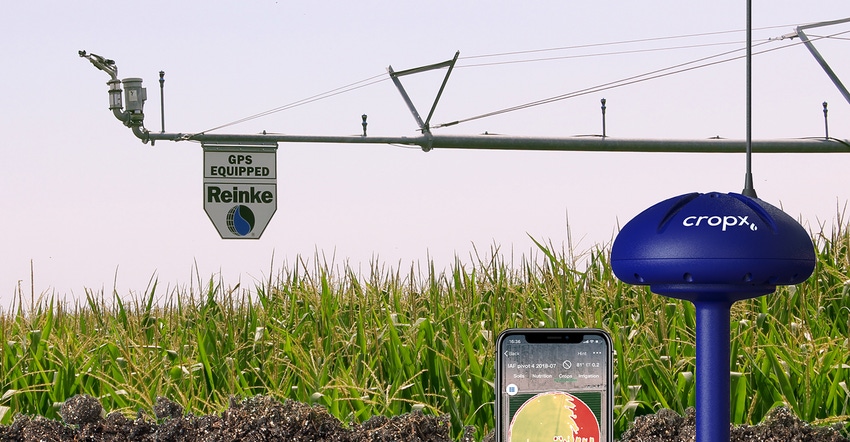
This summer, Nebraska-based Reinke Manufacturing and Israel-based CropX announced a partnership to integrate technologies to boost irrigation scheduling decisions.
Through the partnership, growers using both systems will have access to CropX’s enhanced irrigation data-driven prescriptions that they can incorporate into their Reinke irrigation control system.
Growers with pivots using Reinke’s enhanced, web-based application ReinCloud will see additional benefits by being able to remotely operate their irrigation while they manage CropX data through the integrated platform.
Chris Roth, president of Reinke Manufacturing, notes CropX's soil moisture sensors and other monitoring technology complement and will be integrated with Reinke's ReinCloud platform.
"We'll be able to connect the data from the CropX sensors to ReinCloud, using science and analytics to irrigate more effectively," Roth says. "The sensors will take that data and say, 'You're good right now.' Or it might take that data and say, ‘Now is a good time to irrigate based on the weather forecast, the soil type and soil health.’ We believe this will create higher yields and potentially reduce costs, because they’ll know how much to pump and when it’s needed compared to before."
CropX was founded five years ago in New Zealand with the intent to provide a more concise way to schedule irrigation that isn't overly complicated, explains John Vikupitz, president of CropX.
CropX uses maps, aerial imagery, weather, modeling, user input and its patented soil sensing technology to accurately predict outcomes and provide irrigation recommendations. Earlier this year, CropX acquired Nebraska-based company CropMetrics, adding more than 500,000 acres of soil data to its farm management platform.
"What we did was design our own unit that is integrated into one device, very quick and easy to install and initialized to eliminate that headache and that hassle," Vikupitz says. "We use a proprietary form of ADR [amplitude domain reflectometry], which we decided on because it was able to deliver the accuracy we felt was required, at a cost that was affordable to the average grower."
Boosting adoption
Vikupitz notes that out of all irrigators in the Ogallala Aquifer region, only a fraction — less than 15% — rely on soil moisture sensors or irrigation scheduling technologies to make irrigation decisions. With the Reinke and CropX partnership, he hopes to increase that adoption rate with easy installation and ease of use.
"Most growers turn their irrigation systems on when they see the crop entering some form of stress, or they see their neighbor turn the system on," Vikupitz says. "Ultimately, what we're hoping to do is deliver a more positive economic outcome to growers through this partnership.
"We know from a recent trial on corn in [Wagga Wagga, New South Wales] Australia that by properly scheduling irrigation, compared to the traditional way the grower was doing it, we were able to get 10% higher yields on the sections of the field that we were controlling with our technology."
Roth adds there isn't much additional cost with that 10% yield increase.
"There were costs for the equipment, but it's minimal when you're talking about a 10% increase in yields across a 160-acre quarter section," Roth says. "You take that 10%, and with the operating margins many farmers work on, that 10% is basically pure profit. That's the other thing that was really intriguing to us was the ability to increase revenue with not much additional expense."
"You've got to think about, why have only 15% of irrigators adopted this kind of technology in the past? It's going to come down to cost," he adds. "It's going to come down to simplicity: How easy is it to do it? Not only installation, but how simple is it to get the data out of the field? How simple is it to actually use that data? What we're trying to do with this partnership is break through that."
About the Author(s)
You May Also Like






